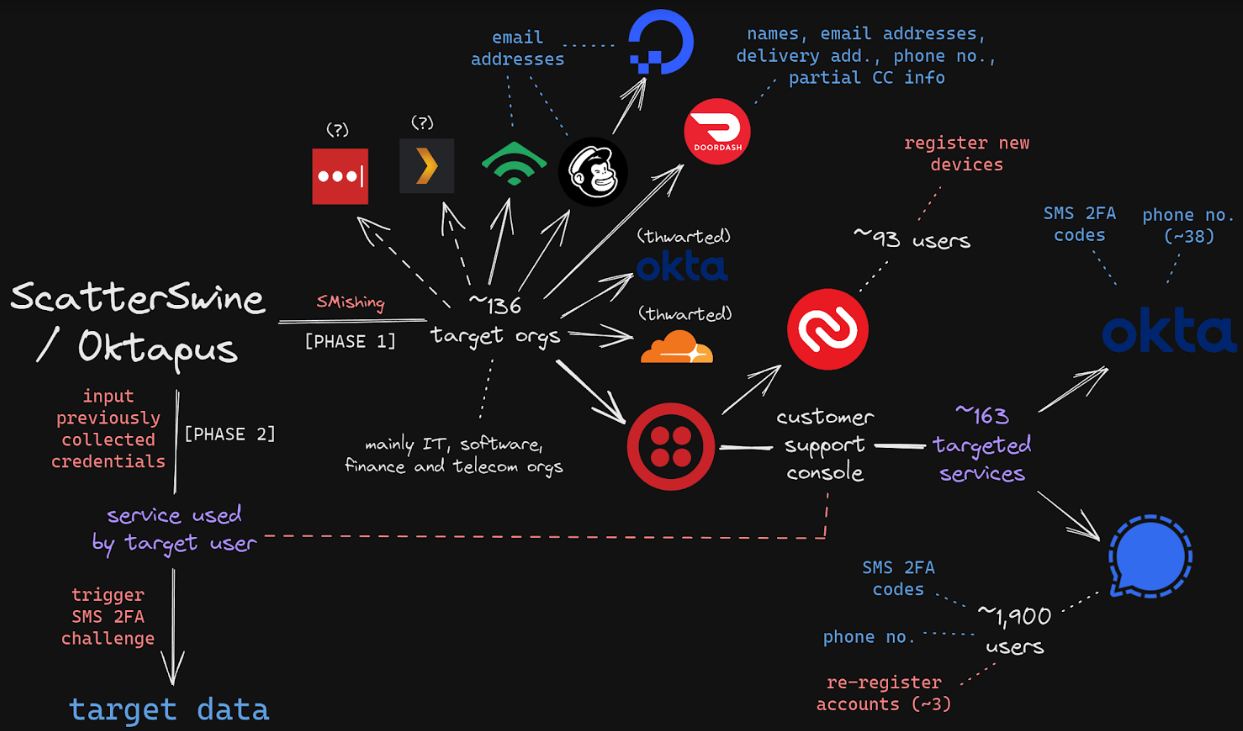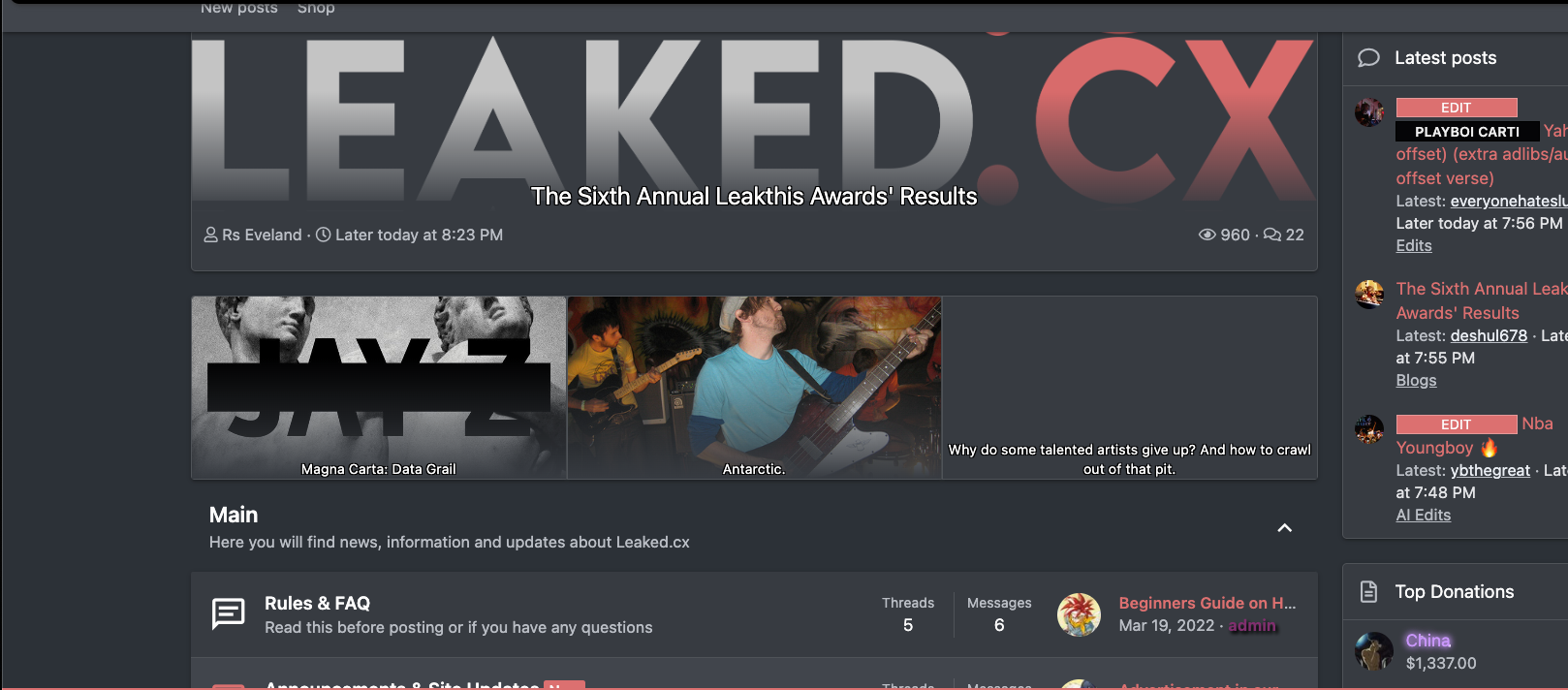
Somehow, an hour and a half went by in the blink of an eye this week. The Spoutible incident just has so many interesting aspects to it: loads of data that should never be returned publicly, awesome response time to the disclosure, lacklustre transparency in their disclosure, some really fundamental misunderstands about hashing algorithms and a controversy-laden past if you read back over events of the last year. Phew! No wonder so much time went on this! (and if you want to just jump directly to the Spoutible bits, that's at the 8:50 mark)


I told ya so. Right from the beginning, it was pretty obvious what "MOAB" was probably going to be and sure enough, this tweet came true:
Interesting find by @MayhemDayOne, wonder if it was from a shady breach search service (we’ve seen a bunch shut down over the years)? Either way, collecting and storing this data is now trivial so not a big surprise to see someone screw up their permissions and (re)leak it all. https://t.co/DM7udeUcRk
— Troy Hunt (@troyhunt) January 22, 2024
What I didn't know at the time was the hilarity of how similar this service would be to those that had come before it... and been shut down by law enforcement agencies. I mean seriously, when you're literally copying and pasting clauses from LeakedSource, what do you think is going to happen?! I sense another "I told ya so" coming...

On Jan. 9, 2024, U.S. authorities arrested a 19-year-old Florida man charged with wire fraud, aggravated identity theft, and conspiring with others to use SIM-swapping to steal cryptocurrency. Sources close to the investigation tell KrebsOnSecurity the accused was a key member of a criminal hacking group blamed for a string of cyber intrusions at major U.S. technology companies during the summer of 2022.

A graphic depicting how 0ktapus leveraged one victim to attack another. Image credit: Amitai Cohen of Wiz.
Prosecutors say Noah Michael Urban of Palm Coast, Fla., stole at least $800,000 from at least five victims between August 2022 and March 2023. In each attack, the victims saw their email and financial accounts compromised after suffering an unauthorized SIM-swap, wherein attackers transferred each victim’s mobile phone number to a new device that they controlled.
The government says Urban went by the aliases “Sosa” and “King Bob,” among others. Multiple trusted sources told KrebsOnSecurity that Sosa/King Bob was a core member of a hacking group behind the 2022 breach at Twilio, a company that provides services for making and receiving text messages and phone calls. Twilio disclosed in Aug. 2022 that an intrusion had exposed a “limited number” of Twilio customer accounts through a sophisticated social engineering attack designed to steal employee credentials.
Shortly after that disclosure, the security firm Group-IB published a report linking the attackers behind the Twilio intrusion to separate breaches at more than 130 organizations, including LastPass, DoorDash, Mailchimp, and Plex. Multiple security firms soon assigned the hacking group the nickname “Scattered Spider.”
Group-IB dubbed the gang by a different name — 0ktapus — which was a nod to how the criminal group phished employees for credentials. The missives asked users to click a link and log in at a phishing page that mimicked their employer’s Okta authentication page. Those who submitted credentials were then prompted to provide the one-time password needed for multi-factor authentication.

A booking photo of Noah Michael Urban released by the Volusia County Sheriff.
0ktapus used newly-registered domains that often included the name of the targeted company, and sent text messages urging employees to click on links to these domains to view information about a pending change in their work schedule. The phishing sites used a Telegram instant message bot to forward any submitted credentials in real-time, allowing the attackers to use the phished username, password and one-time code to log in as that employee at the real employer website.
0ktapus often leveraged information or access gained in one breach to perpetrate another. As documented by Group-IB, the group pivoted from its access to Twilio to attack at least 163 of its customers. Among those was the encrypted messaging app Signal, which said the breach could have let attackers re-register the phone number on another device for about 1,900 users.
Also in August 2022, several employees at email delivery firm Mailchimp provided their remote access credentials to this phishing group. According to an Aug. 12 blog post, the attackers used their access to Mailchimp employee accounts to steal data from 214 customers involved in cryptocurrency and finance.
On August 25, 2022, the password manager service LastPass disclosed a breach in which attackers stole some source code and proprietary LastPass technical information, and weeks later LastPass said an investigation revealed no customer data or password vaults were accessed.
However, on November 30, 2022 LastPass disclosed a far more serious breach that the company said leveraged data stolen in the August breach. LastPass said criminal hackers had stolen encrypted copies of some password vaults, as well as other personal information.
In February 2023, LastPass disclosed that the intrusion involved a highly complex, targeted attack against a DevOps engineer who was one of only four LastPass employees with access to the corporate vault. In that incident, the attackers exploited a security vulnerability in a Plex media server that the employee was running on his home network, and succeeded in installing malicious software that stole passwords and other authentication credentials. The vulnerability exploited by the intruders was patched back in 2020, but the employee never updated his Plex software.
As it happens, Plex announced its own data breach one day before LastPass disclosed its initial August intrusion. On August 24, 2022, Plex’s security team urged users to reset their passwords, saying an intruder had accessed customer emails, usernames and encrypted passwords.
A review of thousands of messages that Sosa and King Bob posted to several public forums and Discord servers over the past two years shows that the person behind these identities was mainly focused on two things: Sim-swapping, and trading in stolen, unreleased rap music recordings from popular artists.
Indeed, those messages show Sosa/King Bob was obsessed with finding new “grails,” the slang term used in some cybercrime discussion channels to describe recordings from popular artists that have never been officially released. It stands to reason that King Bob was SIM-swapping important people in the music industry to obtain these files, although there is little to support this conclusion from the public chat records available.
“I got the most music in the com,” King Bob bragged in a Discord server in November 2022. “I got thousands of grails.”
King Bob’s chats show he was particularly enamored of stealing the unreleased works of his favorite artists — Lil Uzi Vert, Playboi Carti, and Juice Wrld. When another Discord user asked if he has Eminem grails, King Bob said he was unsure.
“I have two folders,” King Bob explained. “One with Uzi, Carti, Juicewrld. And then I have ‘every other artist.’ Every other artist is unorganized as fuck and has thousands of random shit.”
King Bob’s posts on Discord show he quickly became a celebrity on Leaked[.]cx, one of most active forums for trading, buying and selling unreleased music from popular artists. The more grails that users share with the Leaked[.]cx community, the more their status and access on the forum grows.

The last cache of Leaked dot cx indexed by the archive.org on Jan. 11, 2024.
And King Bob shared a large number of his purloined tunes with this community. Still others he tried to sell. It’s unclear how many of those sales were ever consummated, but it is not unusual for a prized grail to sell for anywhere from $5,000 to $20,000.
In mid-January 2024, several Leaked[.]cx regulars began complaining that they hadn’t seen King Bob in a while and were really missing his grails. On or around Jan. 11, the same day the Justice Department unsealed the indictment against Urban, Leaked[.]cx started blocking people who were trying to visit the site from the United States.
Days later, frustrated Leaked[.]cx users speculated about what could be the cause of the blockage.
“Probs blocked as part of king bob investigation i think?,” wrote the user “Plsdontarrest.” “Doubt he only hacked US artists/ppl which is why it’s happening in multiple countries.”
On Sept. 21, 2022, KrebsOnSecurity told the story of a “Foreshadow,” the nickname chosen by a Florida teenager who was working for a SIM-swapping crew when he was abducted, beaten and held for a $200,000 ransom. A rival SIM-swapping group claimed that Foreshadow and his associates had robbed them of their fair share of the profits from a recent SIM-swap.
In a video released by his abductors on Telegram, a bloodied, battered Foreshadow was made to say they would kill him unless the ransom was paid.
As I wrote in that story, Foreshadow appears to have served as a “holder” — a term used to describe a low-level member of any SIM-swapping group who agrees to carry out the riskiest and least rewarding role of the crime: Physically keeping and managing the various mobile devices and SIM cards that are used in SIM-swapping scams.
KrebsOnSecurity has since learned that Foreshadow was a holder for a particularly active SIM-swapper who went by “Elijah,” which was another nickname that prosecutors say Urban used.

Shortly after Foreshadow’s hostage video began circulating on Telegram and Discord, multiple known actors in the SIM-swapping space told everyone in the channels to delete any previous messages with Foreshadow, claiming he was fully cooperating with the FBI.
This was not the first time Sosa and his crew were hit with violent attacks from rival SIM-swapping groups. In early 2022, a video surfaced on a popular cybercrime channel purporting to show attackers hurling a brick through a window at an address that matches the spacious and upscale home of Urban’s parents in Sanford, Fl.
“Brickings” are among the “violence-as-a-service” offerings broadly available on many cybercrime channels. SIM-swapping and adjacent cybercrime channels are replete with job offers for in-person assignments and tasks that can be found if one searches for posts titled, “If you live near,” or “IRL job” — short for “in real life” job.
A number of these classified ads are in service of performing brickings, where someone is hired to visit a specific address and toss a brick through the target’s window. Other typical IRL job offers involve tire slashings and even drive-by shootings.
Sosa was known to be a top member of the broader cybercriminal community online known as “The Com,” wherein hackers boast loudly about high-profile exploits and hacks that almost invariably begin with social engineering — tricking people over the phone, email or SMS into giving away credentials that allow remote access to corporate internal networks.
Sosa also was active in a particularly destructive group of accomplished criminal SIM-swappers known as “Star Fraud.” Cyberscoop’s AJ Vicens reported last year that individuals within Star Fraud were likely involved in the high-profile Caesars Entertainment an MGM Resorts extortion attacks.
“ALPHV, an established ransomware-as-a-service operation thought to be based in Russia and linked to attacks on dozens of entities, claimed responsibility for Caesars and MGM attacks in a note posted to its website earlier this month,” Vicens wrote. “Experts had said the attacks were the work of a group tracked variously as UNC 3944 or Scattered Spider, which has been described as an affiliate working with ALPHV made up of people in the United States and Britain who excel at social engineering.”
In February 2023, KrebsOnSecurity published data taken from the Telegram channels for Star Fraud and two other SIM-swapping groups showing these crooks focused on SIM-swapping T-Mobile customers, and that they collectively claimed access to T-Mobile on 100 separate occasions over a 7-month period in 2022.
The SIM-swapping groups were able to switch targeted phone numbers to another device on demand because they constantly phished T-Mobile employees into giving up credentials to employee-only tools. In each of those cases the goal was the same: Phish T-Mobile employees for access to internal company tools, and then convert that access into a cybercrime service that could be hired to divert any T-Mobile user’s text messages and phone calls to another device.
Allison Nixon, chief research officer at the New York cybersecurity consultancy Unit 221B, said the increasing brazenness of many Com members is a function of how long it has taken federal authorities to go after guys like Sosa.
“These incidents show what happens when it takes too long for cybercriminals to get arrested,” Nixon said. “If governments fail to prioritize this source of threat, violence originating from the Internet will affect regular people.”
The Daytona Beach News-Journal reports that Urban was arrested Jan. 9 and his trial is scheduled to begin in the trial term starting March 4 in Jacksonville. The publication said the judge overseeing Urban’s case denied bail because the defendant was a strong flight risk.
At Urban’s arraignment, it emerged that he had no fixed address and had been using an alias to stay at an Airbnb. The judge reportedly said that when a search warrant was executed at Urban’s residence, the defendant was downloading programs to delete computer files.
What’s more, the judge explained, despite telling authorities in May that he would not have any more contact with his co-conspirators and would not engage in cryptocurrency transactions, he did so anyway.
Urban entered a plea of not guilty. Urban’s court-appointed attorney said her client would have no comment at this time.
Prosecutors charged Urban with eight counts of wire fraud, one count of conspiracy to commit wire fraud, and five counts of aggravated identity theft. According to the government, if convicted Urban faces up to 20 years in federal prison on each wire fraud charge. He also faces a minimum mandatory penalty of two years in prison for the aggravated identity offenses, which will run consecutive to any other prison sentence imposed.

I spent longer than I expected talking about Trello this week, in part because I don't feel the narrative they presented properly acknowledges their responsibility for the incident and in part because I think the impact of scraping in general is misunderstood. I suspect many of us are prone to looking at this in a very binary fashion: if the data is publicly accessible anyway, scraping it poses no risk. But in my view, there's a hell of a big difference between say, looking at one person's personal info on LinkedIn via the browser versus having a corpus of millions of records of the same data saved offline. That's before we even get into the issue of whether in Trello's case, it should ever be possible for a third party to match email address to username and IRL name.
To add some more perspective, I've just posted a poll immediately before publishing this blog post, let's see what the masses have to say:
Scraping: should we be concerned if an individual's personal data is scraped, aggregated en mass and redistributed if that same data is already publicly accessible on the service anyway? Vote and if possible, add more context in a reply.
— Troy Hunt (@troyhunt) January 28, 2024


They're an odd thing, credential lists. Whether they're from a stealer as in this week's Naz.API incident, or just aggregated from multiple data breaches (which is also in Naz.API), I inevitably get some backlash after loading them: "this doesn't tell me anything useful, why are you loading this?!" The answer is easy: because that's what the vast majority of people want me to do:
If I have a MASSIVE spam list full of personal data being sold to spammers, should I load it into @haveibeenpwned?
— Troy Hunt (@troyhunt) November 15, 2016
Spam lists are the same kettle of fish in that once you learn you're in one, I can't provide you any further info about where it came from and there's no recourse available to you. You're just in there, good luck! And if you do find yourself in one of these lists and are unhappy not that you're in there, but rather that I've told you you're in there, you have 2 easy options:
Or, if you've come along to HIBP, done a search and then been unhappy with me, my guitar lessons blog post is an entertaining read 😊
That's all from Europe folks, see you from the sunny side next week!

The rapper and social media personality Punchmade Dev is perhaps best known for his flashy videos singing the praises of a cybercrime lifestyle. With memorable hits such as “Internet Swiping” and “Million Dollar Criminal” earning millions of views, Punchmade has leveraged his considerable following to peddle tutorials on how to commit financial crimes online. But until recently, there wasn’t much to support a conclusion that Punchmade was actually doing the cybercrime things he promotes in his songs.

Images from Punchmade Dev’s Twitter/X account show him displaying bags of cash and wearing a functional diamond-crusted payment card skimmer.
Punchmade Dev’s most controversial mix — a rap called “Wire Fraud Tutorial” — was taken down by Youtube last summer for violating the site’s rules. Punchmade shared on social media that the video’s removal was prompted by YouTube receiving a legal process request from law enforcement officials.
The 24-year-old rapper told reporters he wasn’t instructing people how to conduct wire fraud, but instead informing his fans on how to avoid being victims of wire fraud. However, this is difficult to discern from listening to the song, which sounds very much like a step-by-step tutorial on how to commit wire fraud.
“Listen up, I’m finna show y’all how to hit a bank,” Wire Fraud Tutorial begins. “Just pay attention, this is a quick way to jug in any state. First you wanna get a bank log from a trusted site. Do your research because the information must be right.”
And even though we’re talking about an individual who regularly appears in videos wearing a half-million dollars worth of custom jewelry draped around his arm and neck (including the functional diamond-encrusted payment card skimming device pictured above), there’s never been much evidence that Punchmade was actually involved in committing cybercrimes himself. Even his most vocal critics acknowledged that the whole persona could just be savvy marketing.
That changed recently when Punchmade’s various video and social media accounts began promoting a new web shop that is selling stolen payment cards and identity data, as well as hacked financial accounts and software for producing counterfeit checks.

Punchmade Dev’s shop.
The official Punchmadedev account on Instagram links to many of the aforementioned rap videos and tutorials on cybercriming, as well as to Punchmadedev’s other profiles and websites. Among them is mainpage[.]me/punchmade, which includes the following information for “Punchmade Empire ®”
-212,961 subscribers
#1 source on Telegram
Contact: @whopunchmade
24/7 shop: https://punchmade[.]atshop[.]io
Visiting that @whopunchmade Telegram channel shows this user is promoting punchmade[.]atshop[.]io, which is currently selling hacked bank accounts and payment cards with high balances.

Clicking “purchase” on the C@sh App offering, for example, shows that for $80 the buyer will receive logins to Cash App accounts with balances between $3,000 and $5,000. “If you buy this item you’ll get my full support on discord/telegram if there is a problem!,” the site promises. Purchases can be made in cryptocurrencies, and checking out prompts one to continue payment at Coinbase.com.
Another item for sale, “Fullz + Linkable CC,” promises “ID Front + Back, SSN with 700+ Credit Score, and Linkable CC” or credit card. That also can be had for $80 in crypto.
Punchmade has fashioned his public persona around a collection of custom-made, diamond-covered necklaces that are as outlandish and gaudy as they are revelatory. My favorite shot from one of Punchmade’s videos features at least three of these monstrosities: One appears to be a boring old diamond and gold covered bitcoin, but the other two necklaces tell us something about where Punchmade is from:

Notice the University of Kentucky logo, and the Lexington, Ky skyline.
One of them includes the logo and mascot of the University of Kentucky. The other, an enormous diamond studded skyline, appears to have been designed based on the skyline in Lexington, Ky:

The “About” page on Punchmade Dev’s Spotify profile describes him as “an American artist, rapper, musician, producer, director, entrepreneur, actor and investor.” “Punchmade Dev is best known for his creative ways to use technology, video gaming, and social media to build a fan base,” the profile continues.
The profile explains that he launched his own record label in 2021 called Punchmade Records, where he produces his own instrumentals and edits his own music videos.
A search on companies that include the name “punchmade” at the website of the Kentucky Secretary of State brings up just one record: OBN Group LLC, in Lexington, Ky. This November 2021 record includes a Certificate of Assumed Name, which shows that Punchmade LLC is the assumed name of OBN Group LLC.
The president of OBN Group LLC is listed as Devon Turner. A search on the Secretary of State website for other businesses tied to Devon Turner reveals just one other record: A now-defunct entity called DevTakeFlightBeats Inc.
The breach tracking service Constella Intelligence finds that Devon Turner from Lexington, Ky. used the email address obndevpayments@gmail.com. A lookup on this email at DomainTools.com shows it was used to register the domain foreverpunchmade[.]com, which is registered to a Devon Turner in Lexington, Ky. A copy of this site at archive.org indicates it once sold Punchmade Dev-branded t-shirts and other merchandise.
Mr. Turner did not respond to multiple requests for comment.
Searching online for Devon Turner and “Punchmade” brings up a video from @brainjuiceofficial, a YouTube channel that focuses on social media celebrities. @Brainjuiceofficial says Turner was born in October 2000, the oldest child of a single mother of five whose husband was not in the picture.

Devon Turner, a.k.a. “Punchmade Dev,” in an undated photo.
The video says the six-foot five Turner played basketball, track and football in high school, but that he gradually became obsessed with playing the video game NBA 2K17 and building a following of people watching him play the game competitively online.
According to this brief documentary, Turner previously streamed his NBA 2K17 videos on a YouTube channel called DevTakeFlight, although he originally went by the nickname OBN Dev.
“Things may eventually catch up to Devon if he isn’t careful,” @Brainjuiceofficial observed, noting that Turner has been shot at before, and also robbed at an ATM while flexing a bunch of cash for a picture and wearing $500k in jewelry. “Although you have a lot of people that are into what you do, there are a lot of people waiting for you to slip up.”

Geez it's nice to be back in Oslo! This city has such a special place in my heart for so many reasons, not least of which by virtue of being Charlotte's home town we have so many friends and family here. Add in NDC Security this week with so many more mutual connections, beautiful snowy weather, snowboarding, sledging and even curling, it's just an awesome time. Awesome enough to still be here for the next weekly update so until then, I'll leave you with the pics I promised at the end of this week's vid. Enjoy 😊
Perfect Oslo - fresh snow, cool temps and sunshine 🇳🇴 pic.twitter.com/yPtnCkKIwo
— Troy Hunt (@troyhunt) January 15, 2024


It's another weekly update from the other side of the world with Scott and I in Rome as we continue a bit of downtime before hitting NDC Security in Oslo next week. This week, Scott's sharing details of how he and Joe Tiedman registered a domain Capelli Sport let lapse and now have their JavaScript running on the websites shopping cart page (check your browser console after loading that link) 😲 That's not the crazy bit though, the crazy bit is the months they've spent trying to disclose this to Capelli and getting absolutely nowhere. I'll give them a shout-out this week and see if I have any more luck but when it's this hard to report egregiously bad security issues, is it any wonder we have so many data breaches. As I keep lamenting, it's a great time to be in this industry...


We're in Paris! And feeling proper relaxed after several days of wine and cheese too, I might add. This was a very impromptu end of 2023 weekly update as we balanced family time with doing the final video for the year. On the cyber side, the constant theme over the last week has been ransomware; big firms, little firms, Aussie firms, American firms - it's just completely indiscriminate. Anecdotally, this seems to have really ramped up over 2023 so on that basis, 2024 will bring... well, let's wait and see, this industry is nothing if not full of surprises. Happy New Year friends 😊


It's that time of the year again, time to head from the heat to the cold as we jump on the big plane(s) back to Europe. The next 4 weekly updates will all be from places of varying degrees colder than home, most of them done with Scott Helme too so they'll be a little different to usual. For now, here's a pretty casual Christmas edition, see you next week from the other side 🙂


I'd say the balloon fetish segment was the highlight of this week's video. No, seriously, it's a moment of levity in an otherwise often serious industry. It's still a bunch of personal info exposed publicly and that suchs regardless of the nature of the site, but let's be honest, the subject matter did make for some humorous comments 🤣
